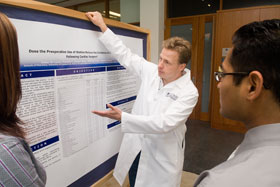  |
| HOME | THIS ISSUE | CALENDAR | GRANTS | BACK ISSUES | < BACK | NEXT > |
Clot-busting drug helps reduce heart attack deaths, say researchersby Beth Krane - October 30, 2006 |
||||
| A study conducted by researchers at UConn and Hartford Hospital found that a little-used treatment option for heart attack patients reduces the risk of death by 61 percent. The study is the only one to date to demonstrate the benefits of administering a low dose of a clot-busting drug before treating patients with balloon angioplasty. Nearly one million heart attacks occur each year in the U.S. Clot-busting drugs and balloon angioplasty are currently the two main alternative treatment options for opening a blocked artery. Balloon angioplasty, an emergency procedure that opens a blocked artery and restores optimum blood flow to and from the heart, is generally the treatment of choice. However, only larger medical centers tend to have the capacity to perform the procedure 24 hours a day. That leaves smaller hospitals faced with the choice of whether to keep heart attack patients and treat them with clot-busting drugs only, or to delay care long enough to transfer the patients to larger medical centers for angioplasty. The median time that elapses between a patient arriving at the first hospital and receiving emergency angioplasty at the second hospital is three hours and three minutes. The third option available to healthcare providers, but unproven until now, is to administer a low-dose of a clot-busting drug prior to transporting a heart attack patient to a larger hospital for the emergency procedure. "Our study shows that this is a safe, effective, and cost-effective practice," says C. Michael White, an associate professor of pharmacy practice. "We hope these findings will encourage more small hospitals to consider this third treatment option." The study, published in the August issue of Clinical Therapeutics, was conducted by researchers from UConn's School of Pharmacy and School of Medicine and at Hartford Hospital. They compared the outcomes for 127 patients who received a low-dose of a clot-busting drug prior to being transported with 127 patients with similar profiles who were transported without first receiving drug treatment. All the patients in the study were transported from smaller, community hospitals in Connecticut to Hartford Hospital for emergency angioplasty between 2000 and 2003. The researchers found:
White said one concern associated with administering a low-dose of a clot-busting drug prior to transferring a patient is the possible risk of increased bleeding, but this study found there was no significant difference in the incidence of bleeding between the two patient groups. "The results of this study represent an important, potentially life-saving advance in the treatment of heart attack patients, particularly those who go to community hospitals that don't have emergency angioplasty services," says Raymond McKay, director of interventional cardiology research at Hartford Hospital. "Although angioplasty has been shown to be the preferred treatment method for heart attack patients, the benefits of this procedure can be diluted when there are long delays before it can be started. By administering early clot-busting drugs that may open an occluded heart attack artery and restore normal blood flow to the heart while the patient is being transferred to an angioplasty center, the negative impact of these delays can be minimized." Dr. Bruce Liang, a cardiologist and director of the Pat and Jim Calhoun Cardiology Center at the UConn Health Center says that since the more time passes, the more heart muscle dies, "the speed with which one opens a blocked coronary artery is critical. "There is interest in use of combination of anti-coagulants and/or clot-busting medication to salvage muscle before angioplasty," Liang says. "Others have supported the investment of resources to develop a rapid transport system aiming at a direct ambulance delivery of heart attack patients to an angioplasty center. A larger, comparative clinical trial is needed." Larger, clinical trials on the effectiveness of this treatment option are currently underway and are needed to confirm these findings, the researchers say. The research team that conducted the study included Craig Coleman, an assistant professor of pharmacy practice at UConn; Dr. William Boden, chief of cardiology at Buffalo General and Millard Fillmore hospitals and professor of medicine and public health at University at Buffalo School of Medicine; and Jeffrey Mather, senior analyst with Hartford Hospital's Department of Research Administration. |
| ADVANCE HOME UCONN HOME |

